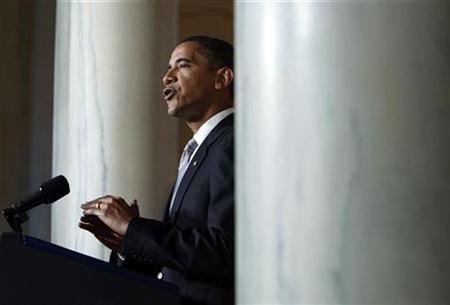Climate Control Debate Heats Up In The Senate
Country: US
Author: Richard Cowan

President Barack Obama makes remarks about climate
change legislation at the White House in Washington, June 29, 2009.
Photo: Jim Young
WASHINGTON - President Barack Obama's drive to fight global warming got a boost on Wednesday as Democrats in the U.S. Senate unveiled a bill aimed at slashing greenhouse gas emissions in the next four decades.
The plan aims to cut emissions of carbon dioxide and other greenhouse gases over the next decades by encouraging broader use of solar, wind and other renewable fuels in place of more polluting ones such as oil.
It also would invest U.S. funds in finding cleaner ways to burn coal and other polluting fuels.
Obama applauded the bill, saying "we are one step closer to putting America in control of our energy future and making America more energy independent."
He said his administration was "deeply committed" to passing a measure.
But the hard political road ahead was evident on Capitol Hill, where senators leading the battle against global warming held a rally to promote the legislation written by liberal Senators Barbara Boxer and John Kerry -- not a single Republican joined them on the stage.
"This is our time. Global warming is our challenge," Boxer said at the rally, where activists held placards touting the 2 million new jobs they said would be created by the bill to develop green energy.
"A NEW ENERGY TAX"
As she spoke, Senate Republican leader Mitch McConnell gave no indication his party would cooperate on climate change any more than it has helped Democrats with healthcare reform.
"The last thing American families need right now is to be hit with a new energy tax every time they flip on a light switch, or fill up their car -- but that's exactly what this bill would do," McConnell said.
Instead of mandating reductions in carbon emissions, many Republicans want legislation that would encourage more U.S. oil and gas production and foster more alternative energy use, especially nuclear power.
Expanding oil and gas production would make the country more energy independent, but it would do nothing to combat global warming.
Like the bill passed in the House of Representatives in June, the 800-page Boxer-Kerry measure would establish a "cap-and-trade" system for replacing fossil fuels with alternative energies to power factories and produce electricity.
Under cap and trade, ever-declining carbon dioxide emission limits would be imposed and companies would be allowed to sell to each other, through a regulated market, the pollution permits controlling those emissions.
NATIONAL SECURITY CITED
Besides weaning the United States off of foreign oil and creating domestic energy jobs in the drive to head off the effects of global warming, the measure would enhance U.S. national security, Democrats said.
"It is time for us to stop and think and get smart about our energy production," Kerry said. "We don't need to be sending billions of dollars overseas, some of which finds its way to support jihadists; terrorists of various countries."
Boxer and Kerry have written a measure that aims to reduce smokestack emissions of carbon dioxide 20 percent by 2020 and 83 percent by 2050 from 2005 levels.
The short-term goal is slightly more ambitious than the 17 percent target in the House.
Even without any curbs being imposed, U.S. carbon emissions are expected to fall 6 percent this year from last year, as electricity demand falls in the recession-hit economy. That would be 8.8 percent lower than in 2005, which is the base year under the emissions-cutting program.
Many U.S. environmental groups joined Obama in welcoming the Senate Democrats' bill, but some said it would not take enough carbon out of the air.
The 20 percent reduction by 2020 is "nowhere near what a fair U.S. contribution to a global emissions reductions should be to avert climate catastrophe," said Friends of the Earth President Erich Pica.
BIG OIL A "CORNERED ANIMAL"?
Joe Mendelson of the National Wildlife Federation praised the legislation and warned that "like a cornered animal, we can expect Big Oil to fight its hardest" against the plan.
American Petroleum Institute President Jack Gerard predicted the legislation, if enacted, would make gasoline prices shoot up to as much as $5 per gallon, about double their current level.
"The losers would be millions of Americans and American companies who rely on gasoline, diesel fuel and other petroleum products to get to work and to school and to run their businesses," he said.
If the Senate cannot manage to pass a climate bill this year, Democrats would likely take up the debate again in 2010.
(Additional reporting by Tom Doggett)
(Editing by Xavier Briand)
© Thomson Reuters 2009 All rights reserved
